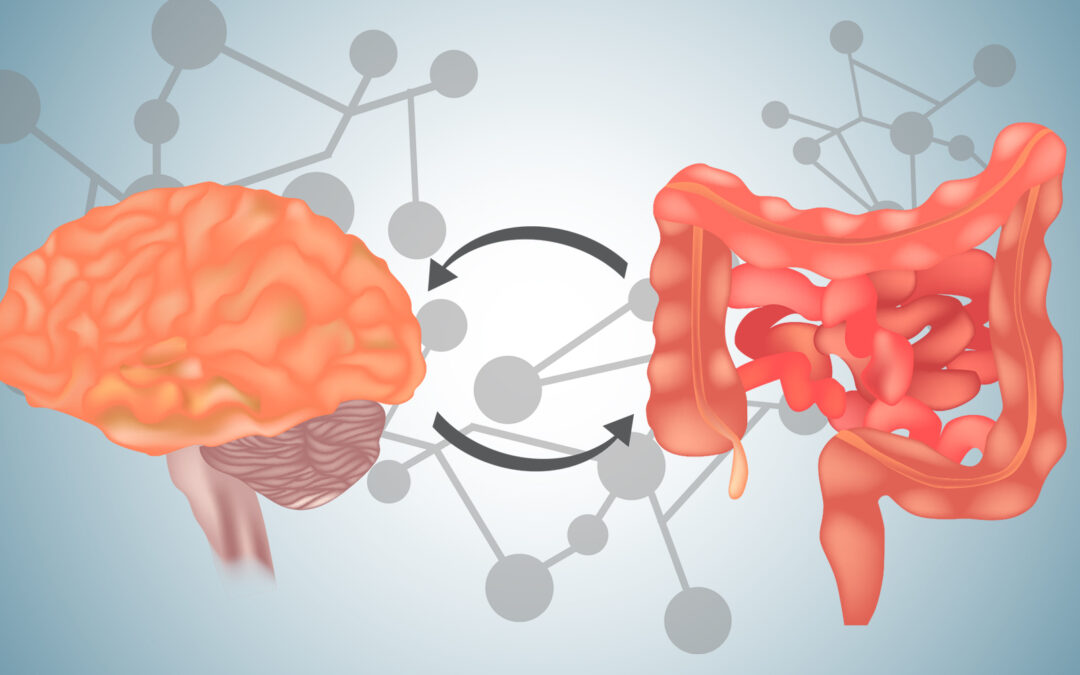The gut-brain connection and mental health such as low mood, ADHD, anxiety and other neurological and psychiatric disorders are closely related.
Even autism spectrum disorders (ASD), Parkinson’s disease, multiple sclerosis and chronic pain are also closely related.
Your gut is your second brain via the gut-brain axis. It is a bidirectional link between the central nervous system (CNS) and the enteric nervous system (ENS) of the body. This occurs primarily through neuroimmune and neuroendocrine mechanisms, often involving the vagus nerve. This communication is dictated by what’s going on in your gut. For example, short-chain fatty acids (SCFA’s) are part of this communication process and they are the main source of energy for the cells lining your colon. You can find SCFA’s in fibre rich foods such as fruit, vegetables and legumes and in foods containing resistant starch such as cooked potatoes and rice.
The Gut-Brain Axis: Two-way Communication
Don’t forget that the gut-brain axis is a two-way communication highway. If you have anxiety and/depression or chronic stress, this is going to have an impact on your gut (signals from your brain to your gut) and the health of your gut is going to have an impact on your brain (signals from your gut to your brain). So how do you know if you have an imbalanced gut microbiome and poor gut health?
- Feeling irritable and moody.
- Interrupted sleep.
- Allergies, intolerances and/or food sensitivities.
- Difficulty in losing weight.
- Depression and/or anxiety.
- Behavioural issues.
- Low energy and fatigued.
- A ‘foggy’ brain.
- Hormones out of whack.
- Constipation, acid reflux, diarrhoea, bloating.
- Skin conditions.
The Gut-Brain Connection and Stress
Given how closely the gut-brain interact, it becomes easier to understand why you might feel nauseated before giving a presentation or feel intestinal pain during times of stress. Chronic stress can affect movement and contractions of the gut, making inflammation worse, or perhaps make you more susceptible to infection.
Stress downregulates your stomach acid and enzyme production making it harder to break down and digest your food. This leaves you susceptible to bacterial overgrowths in the gut, resulting in imbalances in neurotransmitter production. This means low mood, hyperactivity and various psychological disorders.
To reduce stress, treat yourself and have a massage. If this isn’t your thing, go for a walk, try a yoga class, chat with a friend. It doesn’t have to be complicated. Do anything that you enjoy and it’s away from work and home.
Improving the Gut-Brain Connection: First Steps
These are the two tests I use in clinic first and foremost. They give us the information we need to make a good start towards improving gut issues and mental health issues such as low mood, ADHD and anxiety.
GI Map Testing – Your gut is your second brain so we need to see exactly what’s going on in there! We need to see what kind of bacterial overgrowth is there, if there are any parasites or worms, any fungi or yeasts. We also need to see how your gut is functioning. If it’s under-functioning and there’s bacterial overgrowth (most people experience this), your gut will be struggling to produce those neurotransmitters you need for good mental health. You also won’t be able to absorb the nutrients you need from your food.
Food sensitivities – the culprits are usually dairy, eggs, gluten and corn. If you’re not sure and don’t want to follow an Elimination Diet, click here for more information about the Food Biocompatability Test which tests for foods, personal care and household products that you are sensitive to. When you continue to eat, drink and be exposed to certain household and personal care products, you’re creating more inflammation, an important factor in mental health.
If you need help with improving the health of your gut-brain axis, book a free 20 min Zoom health assessment call here.
In this call, you tell me what your main health issues are and I tell you how I address these issues. If we’re not a right fit, that’s fine. Every natural health practitioner has different ways of working and the way I treat people may or may not suit each person.

